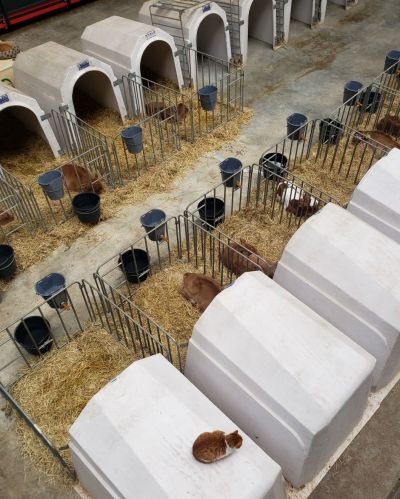
Posted By:
Shepton and Wells Vets: Navigating the Pneumonia Peril in Youngstock
As the seasons shift, the specter of respiratory diseases looms over youngstock, necessitating vigilant care. At Shepton and Wells Vets, we recognize the heightened vulnerability of calves to pneumonia amid fluctuating weather and rising humidity. Wondering how to fortify your youngstock against this respiratory menace? Dive into our comprehensive guide and discover practical tips and preventive measures tailored to shield your calves from pneumonia-related morbidity and mortality.
It’s that time of year again. Youngstock are prone to respiratory disease with the increase in humidity and ever-changing weather conditions. You may wonder what easy improvements you can make to reduce the risk of your calves acquiring pneumonia.
Top Tips for Reducing Pneumonia-Related Morbidity (Illness) and Mortality (Death) in Your Youngstock
- Reduce Stress: Stress (such as transportation, moving and re-grouping) often pre-disposes calves to acquiring pneumonia due to a dip in immune system. Determine factors that may cause stress to your youngstock and then attempt to reduce or eliminate these. One example of this is when calves are weaned. Do not change anything else environmentally or nutritionally (location, grouping, feed, etc.) for 2 weeks before and after the event of weaning.
- Reduce Stocking Density: Lowering stocking density is a great way to not only reduce stress, but also deter the spread of pneumonia-causing organisms. Ideally, calves 3 – 5 months of age should have 4.0m2 per calf, between 5 and 7 months of age should have 5.0m2 each, and older than 7 months of age should have at least 6.0m2 each.
- Avoid Mixing of Age Groups: Keep young animals grouped together with others of similar ages and avoid contact with adult cattle. This is because older animals have a more developed immune system than youngstock, and therefore may harbour disease without showing clinical signs.
- Adequate Ventilation: Ensure your calf shed has adequate ventilation to provide clean, fresh air to calves, and remove water vapour, dust and pathogens.
- Minimise Draught: Too much draft (air speed) is associated with energy loss, discomfort, increased requirement for energy, and compromised health. Air speed should not exceed 2m/s, and ideally remain between 0.2 – 0.5 m/s to avoid a cooling effect.
Other Preventative Measures:
Vaccination: There are different options for vaccinating calves against pneumonia-causing organisms. We offer a calf vaccine round to administer either intranasal respiratory vaccine or injectable. Each of these offer protection against a combination of viral and bacterial causes of pneumonia.
Good Colostrum Management: Good colostrum management practices help give calves a strong start to life. Ensure calves are fed an appropriate volume of good quality colostrum during the first few hours after birth. We offer a practical assessment of on-farm colostrum management through sampling serum total protein levels in calves, checking colostrum quality, and assessing colostrum feeding protocols.
Assessing Extent of Pneumonia Damage to Lungs We can assess the extent of lung damage through thoracic ultrasound (TUS) scoring of lungs. This is done by scanning both left and right lungs of a calf and scoring them based on any observed lesions. Each calf in a group is scored, and then re-scanned at a later date to compare scores on two separate occasions. Often this is done post-treatment to assess response, but it is also used to uncover damaged lungs in calves that may not have shown outward disease. Lung scanning is an extremely accurate way to diagnose and monitor pneumonia in calves.
If you would like to find out more information on calf housing assessment, vaccinating, assessment of colostrum management on your farm, and/or lung scanning of calves, please do not hesitate to contact the farm office and speak to one of our team.
Whilst on my visits I have been having several discussions...
As our feline friends get older there are a few conditions...
Another winter discussion group season is now behind...
©2024 Shepton Veterinary Group Ltd., All rights reserved.
Privacy Policy • Terms & Conditions • Cookie Policy